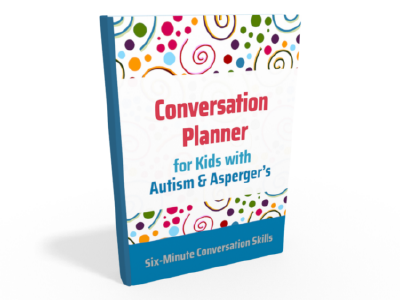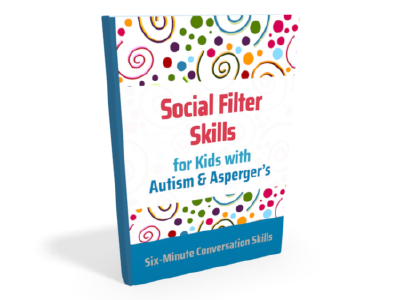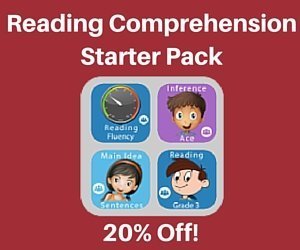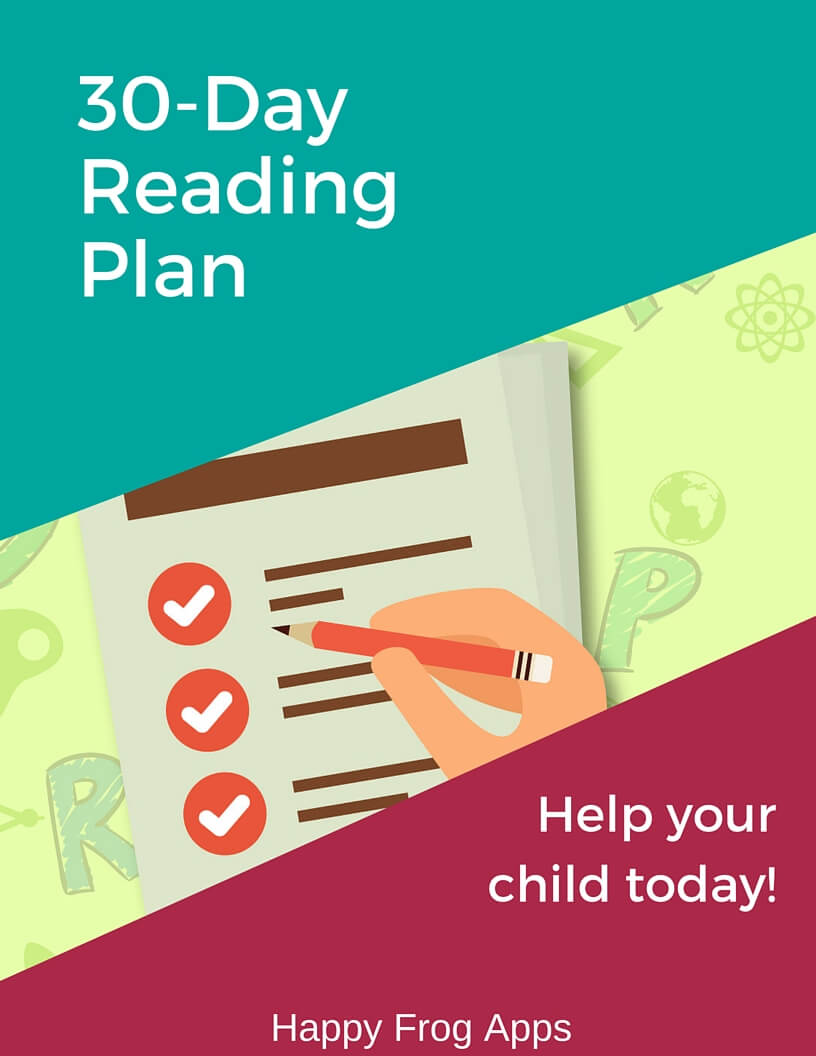Category: Learning Strategies
How Happy Frog Helps With Social Skills

What to Do About Social Skills?
Your ASD child is in elementary school. He is doing okay, but you know his social skills are weak.
What do you do?
I’ve been in the same boat. That’s why Happy Frog builds social skill resources as well as reading resources.
With ASD kids in elementary school, it comes down to conversation. Your child’s peers are talking to each other and your learner needs to be able to join in – appropriately!
We have workbooks, apps and social skills curriculums targeting specific social skills. Let’s see how Happy Frog can help.
Six-Minute Social Skills
Our six-minute social skill series is designed for busy parents and professionals who need a quick way to incrementally build and generalize critical social skills. You can literally pick up the book and teach a skill in any spare ten minutes.
Planning Ahead
Learners with Autism do well with rehearsing a situation before it occurs. Conversation Planner teaches a multi-step strategy for preparing for a conversation.
Using the Conversation Planner app, students learn to think about who they are talking to, what that person will expect, when to know the person is ready for the conversation, etc.
Students learn each step individually and then combine the steps to rehearse the complete situation. The app includes over 100 typical real-life situations.
Prefer workbooks? Here you go!
Strengthening the Social ‘Filter’
We all know that our wonderful ASD kids need a little help with their social filter. Happy Frog has you covered.
Our “Say It… Or Not?” app teaches children with Autism what to say… and what not to say… in awkward or frustrating social situations.
Your learner will begin by thinking about how people feel if you say something nice versus something rude or awkward.
Next, they’ll evaluate specific examples to decide whether it is okay to say, or not. Finally, given a specific scenario, learners will decide what is a good thing to say in that situation.
Over 100 real-life social situations with more than 400 possible responses provide a wide variety of practice in dealing with challenging situations.
If you prefer a workbook, you can access the same practice materials with our workbook.
Talking with Friends
Making friends and maintaining friendships is a struggle for children with Autism. The How to Talk with Friends curriculum teaches ASD learners the key skills they need to talk and engage with their peers.
Designed with twelve weekly lessons, this hands-on manual provides everything you need to run a successful social skills group or one-to-one lesson.
If you have at-home sessions, this is a great choice for a really practical, scripted program that any tutor can deliver. If you can get your school on board, even better!
Available in print, PDF or Kindle.
ASD kids can develop strong social skills. You just need the right tools to help them along. Happy Frog is proud to join you on your journey!
If you have any questions about any of these resources, we are happy to answer them! Contact us via the green Help button on the lower right.

Why You Need To Teach Inference Skills to Struggling Readers

Inference skills are one of the key skills required for reading comprehension. In fact, according to Marzano (2010) , inference is a “foundational skill” — a prerequisite for higher-order thinking.
If you have a struggling reader, read on to learn all you need to know about this important skill.
What are Inferences?
Firstly, let’s explain what inferences are.
Making an inference involves using what you know to make a guess about what you don’t know. For example, look at the following sentence.
John got out of his comfortable chair and turned on the light.
From this we can guess, that it is dark… or starting to get dark. We can make this inference because we know that people usually turn on lights when there isn’t enough light to see.
When it comes to reading, inferencing should happen multiple times per sentence.
Looking at that same example, we can also infer that John is now standing. The author did not state that he is now standing, but we can infer because we know that when people get up from a chair, they are usually standing.
We can also infer that he might be in the living room, since the chair is referred to as ‘comfortable’ and people typically read in the living room.
One sentence – at least three inferences. And it is these inferences that allow us to visualize the story.
Why is inferencing important?
Good comprehension cannot happen without inferencing — it’s a foundational skill. It’s that simple.
If you want your child to have good comprehension, then they need to have strong inferencing skills.
How Happy Frog Helps
We have a variety of resources to get you started.
Inference Ace and Inference Clues provide step-by-step instruction and practice on inference skills.
The apps teach 10 different types of inferences. Students learn in a fun, game-like environment and there is a Reward Center to provide additional motivation.
Check them out on the app store. We recommend starting with Inference Ace.
![]()
![]()
If you prefer workbooks, we’ve got you covered.
This 60-page PDF workbook builds skills in all ten types of inferences that are needed for fluent comprehension.
The workbook is designed to appeal to non-motivated learners. One or two pages a day will make your learner feel successful and relieve your worries.
Info We Referenced
Marzano, R. (2010). Teaching inference. Educational Leadership, 67(7), 80-01. Available online at
http://www.ascd.org/publications/educational-leadership/apr10/vol67/num07/Teaching-Inference.aspx
.
Other research that supports this strategy
Beers, Kylene. (2003). When kids can’t read: What teachers can do. Portsmouth, NH: Heinemann.
Gregory, A.E., & Cahill, M. (2010, March). Kindergartners Can Do It, Too! Comprehension Strategies for Early Readers. The Reading Teacher, 63(6), 515-520.
Harvey, Stephanie, & Goudvis, Anne. (2000). Strategies that work (pp. 277-281). York, ME: Stenhouse.
Ozgungor, S., & Guthrie, J. T. (2004). Interactions among elaborative interrogation, knowledge, and interest in the process of constructing knowledge from text. Journal of Educational Psychology, 96(3), 437-443.
How to get homework DONE!
Kids who struggle with reading aren’t usually the best at getting their homework done effectively and efficiently.
And that can lead to the dreaded ‘homework battles.’
As parents, we want the time we spend with our kids to be fun and meaningful, not filled with arguments and tears.
In this post, we look to 3 experts who have some great suggestions on how to minimize or get rid of homework trauma.
1. Free webinar: Strategies for Students with ADHD
In this free webinar, Ann Dolin, M.Ed., discusses:
- Tips for creating a stress-free homework environment
- How to help ADHD students stop rushing and making careless mistakes
- Strategies for dealing with procrastinators and perfectionists.

All parents can benefit from watching this, not just ADHD parents. Signup is needed, but it’s a great webinar!
3. A Quick Read…
Don’t have time for a webinar… or need a solution RIGHT NOW? Kate Fermia’s article is to-the-point and has great ideas.

3. Another free webinar!

ADHD kids typically struggle with homework. That’s why resources for ADHD can be awesome for ANY family with the homework struggles.
Dr Joshua Langberg has developed a system for parents and educators to help children with the skills needed to organize and plan homework. Excellent viewing at any time of year. Again, signup is needed.
And our advice is… take any opportunity you can to congratulate your child on success, whether it be homework-related or not. Struggling kids need a champion in their corner!!!
Homework… and life… don’t have to be a battle. Find tools and strategies to help.










